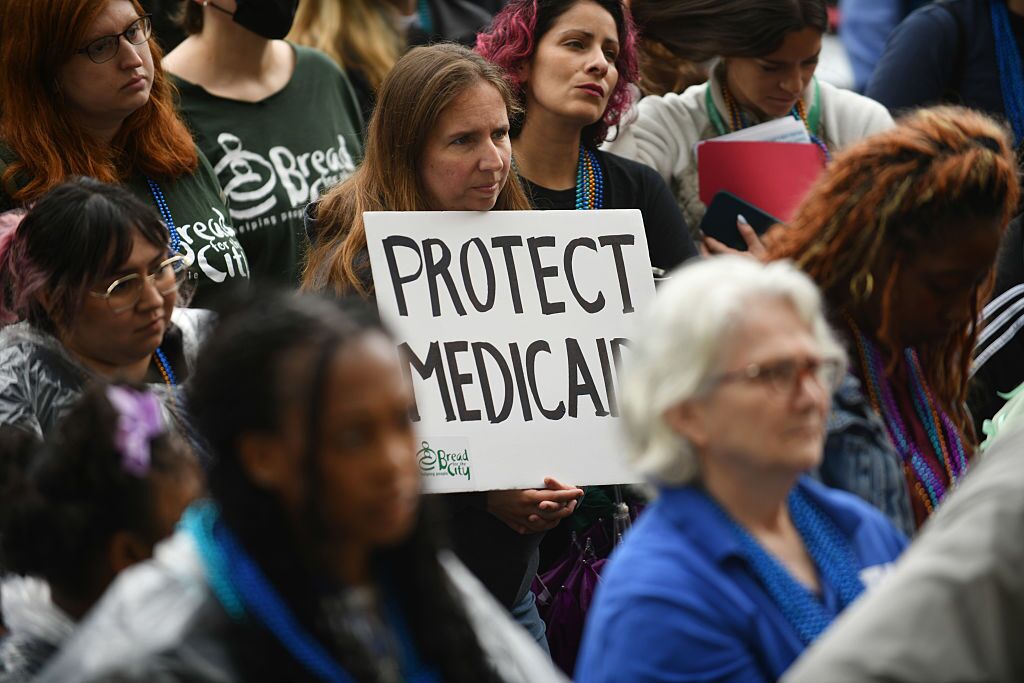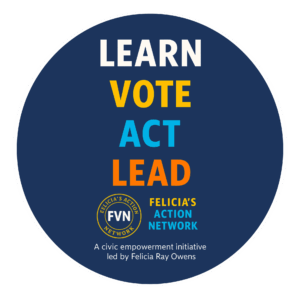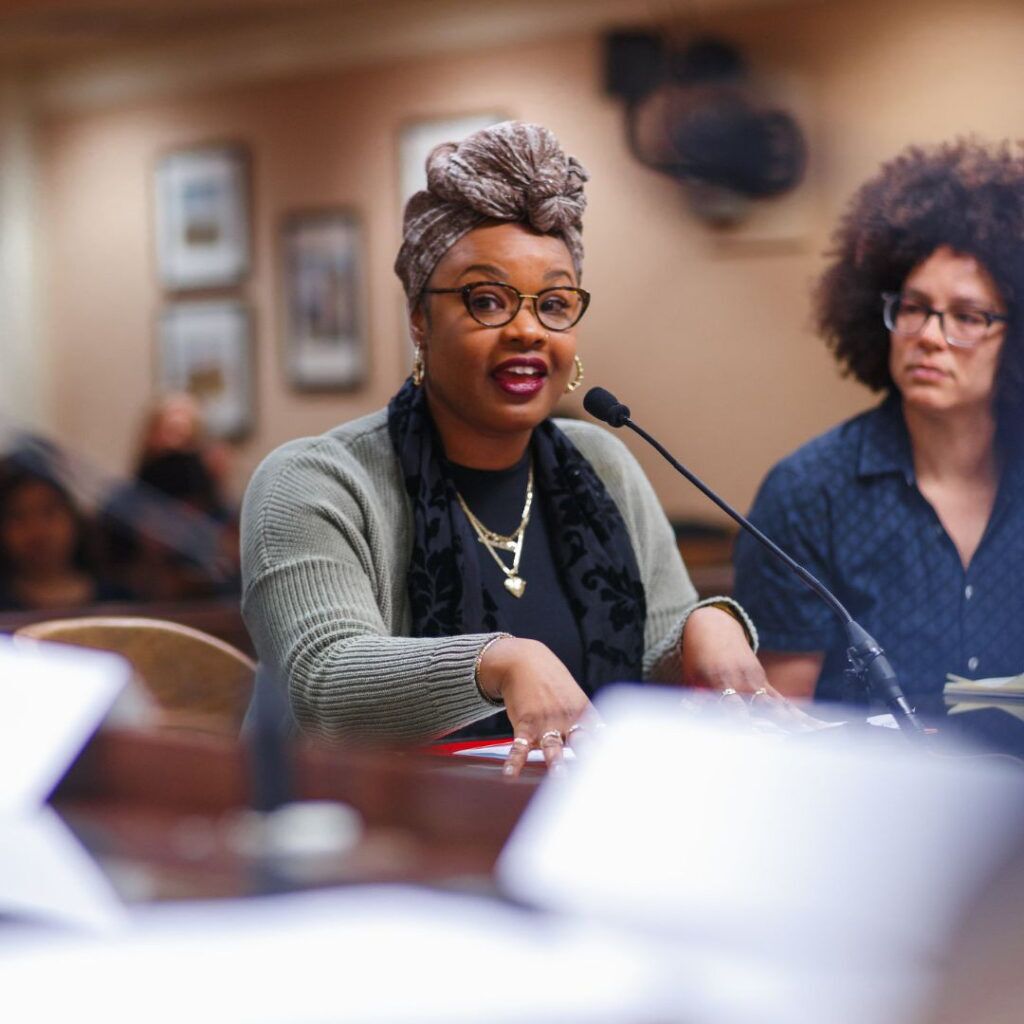
Who Gets Hurt When Congress Cuts Healthcare and Food Aid? Everyone But the Rich.
May 29, 2025
Illinois Lawmakers Ban Police From Ticketing and Fining Students for Minor Infractions in School
May 29, 2025Health and Human Services Secretary Robert F. Kennedy Jr. announced this week that the federal government no longer recommends the COVID-19 vaccination for healthy pregnant people and healthy children, a move that immediately raised questions from medical experts.
“Despite the change in recommendations from HHS, the science has not changed. It is very clear that COVID infection during pregnancy can be catastrophic and lead to major disability, and it can cause devastating consequences for families,” Dr. Steven J. Fleischman, president of the American College of Obstetricians and Gynecologists said in a statement. “The COVID vaccine is safe during pregnancy, and vaccination can protect our patients and their infants.”
Kennedy did not cite any data along with his decision, though he has long questioned the need for frequent COVID-19 boosters for children.
Removing COVID vaccines from the Centers for Disease Control and Prevention’s recommendations for pregnant people or children could impact the availability of the vaccines or if they are covered by insurance. Dr. Sean T. O’Leary, chair of the Committee on Infectious Diseases for the American Academy of Pediatrics, said that removing the recommendation “could strip families of choice.”
“Those who want to vaccinate may no longer be able to, as the implications for insurance coverage and access remain unclear. … What is clear is that pregnant women, infants and young children are at higher risk of hospitalization from COVID, and the safety of the COVID vaccine has been widely demonstrated,” he said.
An HHS spokesperson did not immediately respond to The 19th’s request for comment.
Here’s what we know about Kennedy’s announcement and how it could impact pregnant people and access to the vaccines.
Why were COVID-19 vaccines recommended to pregnant people and children to begin with?
Scientific studies have shown that pregnant people are at higher risk of developing more severe cases of the virus than people who aren’t pregnant. As a result, pregnant people are more likely to end up hospitalized. They are also over 10 times more likely to die from COVID-19 compared to the general population. Studies have also shown a link between COVID and an increased risk of stillbirth.
Vaccinating pregnant people has not only been shown to lower these risks, but also offers some protection to newborns. Antibodies from a parent who received the vaccine while pregnant can provide some immunity to infants in the weeks and months after birth, according to Charlotte Moser, co-director of the Vaccine Education Center at the Children’s Hospital of Philadelphia. “[It] is the safest way to protect those babies,” she said in an email.
Studies have shown that COVID-19 may be less severe in healthy children. But Moser said children who become infected with COVID-19 are at risk of being hospitalized, developing long COVID or dying from the virus. COVID-19 vaccines decrease those risks.
Will my health insurance still cover a COVID-19 vaccine if I’m pregnant? What about for my children?
“It is not totally clear yet,” said Joshua Sharfstein, a public health professor at the Johns Hopkins Bloomberg School of Public Health. He was also a Food and Drug Administration (FDA) official under the Obama administration.
Under the Affordable Care Act, insurance providers are required to cover vaccines recommended by the CDC, but some experts, including Sharfstein, are concerned that this announcement could mean insurance companies are no longer mandated to cover the COVID-19 vaccine for “healthy” pregnant people and children.
It’s still too early to know whether private insurance companies will remove vaccines from their coverage. It may still be more cost effective for companies to pay for the vaccine, versus paying for severe illnesses that might result from being unvaccinated, experts said.
Sharfstein said private insurance is still clearly required to cover a COVID-19 vaccine for a pregnant person or child who has a medical condition that meets the criteria for a higher risk of severe COVID.
But it’s unclear who falls under these categories, said Dr. Kathryn Edwards, a longtime expert in infectious diseases. She noted that the health secretary is contradicting an FDA announcement last week that listed pregnant people as a high risk category that makes them eligible for the vaccine.
“They need to get their message straight,” she said in an email.
How will this affect access to COVID-19 vaccines?
That’s also unclear. Richard Hughes, an attorney at the law firm Epstein Becker Green, who previously served as vice president of public policy for a major vaccine manufacturer during the COVID pandemic, said manufacturers could eventually reduce their supply as they determine their bottom lines. That could shake up overall product availability at doctors’ offices and pharmacies.
In addition, if private insurance companies stop covering the vaccine, it could be a barrier for those with low incomes.
“We know that any amount of out-of-pocket [cost] for a vaccine is going to discourage a patient from getting vaccinated,” he said. “The more that increases, the less likely they are to get it.”
This announcement does not immediately impact the Vaccines for Children (VFC) Program, a federally-funded initiative that aims to vaccinate children whose parents or caregivers might not be able to afford them. However, given how the health secretary has sidestepped protocol to remove this recommendation for pregnant people, some experts worry that Kennedy may similarly make decisions for the VFC program.
Wait, so can Kennedy do this?
Medical experts say Kennedy’s announcement — which came via a one-minute video posted on X — appeared unilateral, since a key vaccine panel that would typically make such recommendations did not appear to vote on the matter. The Advisory Committee on Immunization Practices (ACIP), which is housed under the CDC, isn’t scheduled to meet again until June.
Kennedy, as HHS secretary, does have legal authority to modify recommendations made by an advisory committee, according to Hughes.
But experts say this decision is highly unusual. This is the first time a health secretary has circumvented the typical review process for vaccination recommendations, and experts stressed that making these kinds of decisions — which they described as not using the science-based procedures that are in place — puts lives at risk.
Several also noted Kennedy’s lack of medical expertise and his long history of vaccine skepticism.
“This signals that health advice for all Americans is now subject to the whim of the secretary of HHS who has no relevant expertise and a long track record of misleading people about vaccines. This should be of concern to everyone,” said Marc Lipsitch, a professor of epidemiology at Harvard’s school of public health, in an email.
Will this decision face legal challenges?
“I expect there will be lawsuits and I expect the administration is not in a good position for those lawsuits,” said Dorit Rubenstein Reiss, a professor of law at the University of California College of Law, San Francisco.
Reiss predicted the decision will be challenged in court by patients who could file a lawsuit if they are denied coverage for the vaccine from insurance companies. Cities and states who buy the vaccination could also sue, she said.
Both the lack of evidence presented by the health secretary and what appeared to be procedural irregularities in making this decision could bolster these court challenges, she said. Not only did Kennedy appear to sidestep the committee that makes these decisions, but he appears in the announcement alongside Jay Bhattacharya, director of the National Institutes of Health, and Marty Makary, the commissioner of the FDA. Those men have an anti-COVID vaccine bias, and neither role is typically involved in vaccine recommendations.
“It’s ignoring our usual process that involves expert deliberation and examination of the decision and making what looks like a political decision without a lot of consideration of the effects,” she said.
The fact that Kennedy did not provide evidence for the change is also problematic, Reiss said.
“If you look at the recommendation for pregnant women, it’s a lengthy document by ACIP setting up why they think pregnant women should get the vaccine [which includes] data,” she said. That decision can’t be reversed with a one-minute video on social media, she said. “Under administrative law, an agency is expected to explain its actions.”
Great Job Jessica Kutz & the Team @ The 19th Source link for sharing this story.








